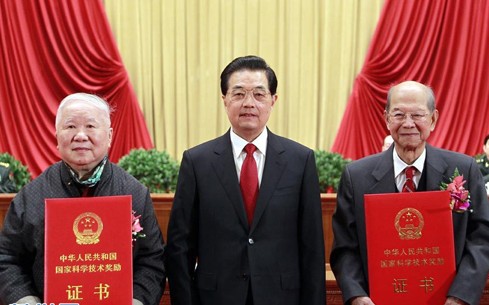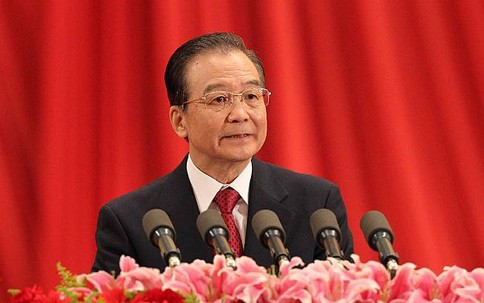| News & Events |
| Location:Home > News & Events > Science and Technology News |
| China Eyes Innovation-Powered Development, Honors Excellent Scientists |
Two Chinese scientists, physicist Xie Jialin and architect Wu Liangyong, were both given China's top science and technology award Tuesday morning at a high-profile annual ceremony held to honor excellent scientists and research achievements.
President Hu Jintao delivered certificates to the two top scientists, shook their hands and congratulated them on their achievements. In his address at the ceremony, Premier Wen said that China should fundamentally count on its reform and opening-up drive, systematic innovation and scientific progress as the way to overcome the influence of external economic crises, solve systematic and structural problems and achieve development in leaps and bounds. China aims to build itself into an innovative country by 2020, when scientific progress will contribute to nearly 60 percent of the nation's economic growth, according to a national outline for scientific and technological development (2006-2020), launched in March 2010. "We should be sharp-eyed on new opportunities that the economic crisis has brought for new revolutions in science and technology," Wen said, urging efforts to accumulate new advantages for the Chinese economy by deepening science and technology-related systematic reforms. Eyeing further innovation-powered development, China has been offering annual awards to elite scientists for 12 consecutive years since 2000, and 20 top scientists, including Xie and Wu, have won the award so far. Xie Jialin, 92, studied at Yanching University in China and California Institute of Technology in the United States, and then obtained a Ph.D from Stanford University. He returned to China in 1955. Xie is best known for helping China build its first electron linac (linear particle accelerator) in 1964 and contributed to the research and design of the Beijing Electron Positron Collider (BEPC), the country's first large-scale scientific facility for basic research, in the 1980s. In his decades-long research career, Xie has made outstanding achievements regarding accelerator physics, accelerator technology and the free electron laser. His research efforts have helped bring China's relevant research to an international vanguard group. "My lifelong aspiration has simply been to become a man useful to the country and the people. It never occurred to me that I should make fame or profit from my work," said Xie, who was elected an academician of the Chinese Academy of Sciences in 1980. Wu Liangyong, 89, gained a bachelor's degree in architecture from National Central University in Chongqing, China in 1944 and then a master's degree in architecture and urban design from Cranbrook Academy of Art in the United States five years later. When he returned to China in 1950, Wu committed himself to city planning, architectural design and landscape planning, as well as teaching and scientific research. Wu earned his reputation for developing the science of human settlements in China and combining it with China's urbanization.
A team from Tsinghua University also clinched first prize in the State Technology Invention Award for their technological breakthrough in the field of Organic Light Emitting Diode (OLED). Bringing lower power consumption and longer service life to OLED products, their technology had been put into use for spacesuits with which spacemen aboard Shenzhou VII conducted extravehicular activities. Thirty-six projects received second place prizes of State Natural Sciences Award, but the first place prize was not awarded for the 8th time in the last 12 years. Three scientists from Japan and five from Germany, France, Britain, the United States and Australia won the International Cooperation Award in Science and Technology. While presiding over the ceremony, Vice Premier Li Keqiang said science and technology is, in a sense, the most active and revolutionary element in social and economic development, and it is also a driving force of social progress. Li called on the country's researchers and workers in the scientific and technological fields to learn from the award winners. Li also urged them to better combine their career ambitions as well as their professional knowledge and skills with the country's development, social progress and improvement of people's livelihood, and to support the country's causes of transforming the economic development pattern and building an innovative country. (Source: Xinhua) |
| Appendix Download |
|
|

 Of the award-winning research projects featured at the event, original broadband mobile telecommunications transmission technology and organic light-emitting technology earned first place in the State Technology Invention Award.
Of the award-winning research projects featured at the event, original broadband mobile telecommunications transmission technology and organic light-emitting technology earned first place in the State Technology Invention Award.